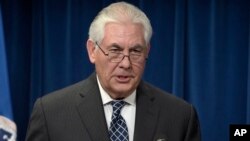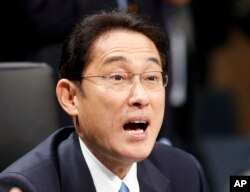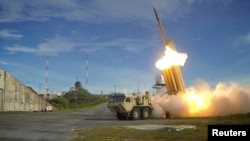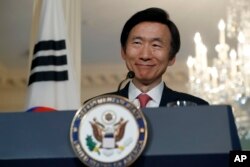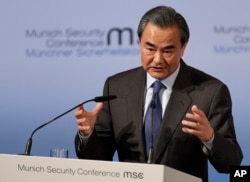The United States is rallying regional allies and partners to take urgent steps to address the North Korean nuclear and ballistic missile threat, with Secretary of the State Rex Tillerson soon to embark on his first Asia trip as the top U.S. diplomat.
Experts said Secretary Tillerson is facing an immediate challenge to bring China on board with the deployment of a controversial U.S. missile defense system in South Korea, the so-called Terminal High Altitude Area Defense (THAAD) system.
Tillerson is scheduled to have talks with Japanese Foreign Minister Fumio Kishida, South Korean Foreign Minister Yun Byung-se and Chinese Foreign Minister Wang Yi, according to several Asian media reports.
The State Department has not confirmed this trip.
“We are not going to share the details of our diplomatic engagement,” a State Department spokesperson told VOA on Monday.
“We remain prepared — and will continue to take steps to increase our readiness — to defend ourselves and our allies from attack, and are prepared to use the full range of capabilities at our disposal against this growing threat,” the spokesperson added.
Missile launches
Earlier on Monday, North Korea fired four ballistic missiles, three of which flew about 1,000 kilometers (620 miles) and landed in Japanese waters.
The United States and Japan, in coordination with South Korea, have requested urgent United Nations Security Council consultations on North Korea's most recent ballistic missile launches.
White House spokesman Sean Spicer told reporters on Monday that such launches are “provocative behavior.”
“The Trump administration is taking steps to enhance our ability to defend against North Korea's ballistic missiles, such as through the deployment of a THAAD battery to South Korea,” Spicer said.
China voiced strong objections, however, to the planned installation of THAAD anti-missile system.
Chinese Foreign Ministry spokesperson Geng Shuang said on Monday that such deployment would undermine “the strategic balance of the region” and “the security interests” of countries, including China.
China's opposition is unlikely to change in the near future, according to analysts.
“China has every incentive to keep the status quo on the Korean peninsula intact for the foreseeable future,” Harry Kazianis from the Center for the National Interest told VOA on Monday.
“China desires stability and a friendly regime in Pyongyang to act as a buffer from a South Korea allied with the United States. While the status quo is certainly not pretty — as witnessed with the recent North Korea missile tests of late — it does work for Beijing,” Kazianis added.
Boycott sought
China's state media are calling for a boycott of South Korean goods and sanctions after Lotte Group, a Korean conglomerate, approved a land swap deal at home that paves the way for the THAAD deployment.
Washington said the deployment of the anti-missile system is to counter threats from North Korea and to defend U.S. allies in the region.
Last year alone, Pyongyang tested two nuclear devices and carried out nearly two dozen rocket launches in continuing efforts to expand its nuclear weapons and missile programs.
The State Department declined to update the status of an ongoing comprehensive policy review on North Korea, ordered by the White House soon after President Donald Trump took office, to look at all the options Washington has for its future dealings with Pyongyang and the Kim Jong Un regime.
But some Democratic lawmakers have proposed steps that include coercive diplomacy, enforcement of sanctions, and a strengthened regional military deterrence posture with allies.
In a letter sent to President Trump and Secretary of State Tillerson, Democratic Senators Edward Markey and Al Franken argued “only a comprehensive approach that couples pressure with active diplomatic engagement” will achieve the goal of a nuclear-free Korean peninsula.
“It has become evident that sanctions, without negotiations, will not induce the Kim regime to unilaterally constrain its nuclear weapons and ballistic missile programs,” according to the congressional letter.
Six-party talks
The United States, Russia, China, Japan, and South and North Korea are members of the so-called six-party talks, a series of multilateral negotiations held intermittently since 2003 for the purpose of dismantling North Korea's nuclear program.
Under a 2005 joint agreement , North Korea agreed to abandon all nuclear weapons and existing programs in exchange for economic aid, security guarantees and improved diplomatic ties.
But Pyongyang failed to live up to its commitment and has since conducted several nuclear and missile tests.




